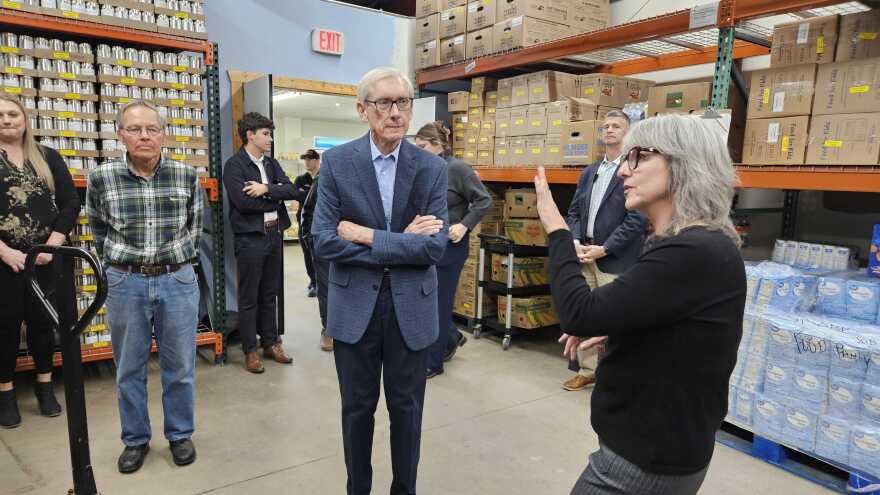Volunteers at the Rhinelander Area Food Pantry fill a shopping cart with an online order. The online shopping option for food pantry customers started during the COVID pandemic, says Food Pantry Executive Director Courtney Smith.
“About 30% of our shopping is done through online orders,” said Smith.
The online shopping is just one way Smith says the pantry provides its customers dignity and autonomy when it comes to using their services.
It comes through in other ways like giving people their choice of meats, including Thanksgiving specific foods as part of their regular orders, and making the experience of getting food from the pantry closer to shopping at a grocery store.
For Smith, that emphasis on dignity and autonomy is renewed with each new household that registers with them. And there have been a lot of new registrations in the last two years.
Last year the Rhinelander Area Food Pantry surpassed 1,000 registered households. For the first time, they’re serving children than seniors.
“We experienced the greatest growth in need in our community and registered households at our food pantry in 2024. Throughout 2025 we were just seeing kind of that normal 10% increase,” said Smith.
Then in late October, the Trump Administration told states that SNAP benefits would be delayed in November because of lack of funding during the government shutdown.
“Our new households quadrupled in number of new registrations. We are seeing also folks who haven't used the pantry in several years, returning and coming back to shop at the pantry,” said Smith.
Federal changes
Both of those increases in registrations coincided with reductions or changes in federal support.
In response to the pandemic, the federal government pushed out a lot of additional funding and created new support programs for lower income households.
They were so successful that the Rhinelander pantry actually saw a substantial dip in households they were serving down to about 570.
In 2024, when those programs and extra support ended, more people started with or returned to the food pantry.
And then again, the sharp increase at the beginning of this month came as SNAP benefits were delayed during the government shutdown.
“The food pantry system is really a gap filler to kind of support the social safety net that SNAP and other policies provide,” said Smith.
Smith made it clear that not all people that use the pantry use SNAP and vice versa as there are currently about 2,200 individuals registered with the pantry while there is well over 3,000 SNAP recipients in Oneida County.
“SNAP is powerful enough, if you say that those are all the same people, to keep potentially about 1,200 people from needing to shop at the food pantry,” said Smith. “We know that SNAP is first and foremost that most effective tool that gives households autonomy to shop. It also is an incredible generator of economic activity in our community.”
Governor Tony Evers visited the Rhinelander Area Food Pantry this week to learn about the pantry operations and how the delay in SNAP benefits impacted it.
While the SNAP benefits are funded through next September under the latest funding package that was passed to reopen the government, Evers is concerned more and more people will need to rely on their community food pantries as the cost of things like healthcare is projected to rise if the Affordable Care Acts subsidies aren’t extended.
“If it's going to cost some people that are on the Affordable Care Act, and there's many in this part of the state, if that becomes a thing and they have to spend more, double in some cases, that means their ability to feed themselves is going to be impacted too. So that's a concern that I have,” said Evers.
Community Support
Smith expects that many of the people that registered during the SNAP delay will continue to use their services.
She’s confident that the pantry will be able to meet this increased demand in the community because of the community, as evident by the response Smith saw as the SNAP delays were making headlines.
“We've had folks just literally walk through the door and say, ‘How are you guys doing? What do you need?’ They're donating funds. They're donating food,” said Smith. “This year, our in-kind donations of food from individuals in our community was down by about 30%. I'm pretty sure we made up for that in about the first 10 days of November.”
Smith hopes that charitable spirit will continue.
The Rhinelander Area Food Pantry doesn’t receive any federal or state funding to operate.
It’s supported by fundraising efforts, grants, in-kind food donations, and the 100-plus volunteers that donate their time.
“Our food pantry exists because our community wants to feed people. We're funded by our community. They staff it. They shop it,” said Smith. “It just goes to show how important it is to us here in the Northwoods to make sure that everybody has enough to eat.”









